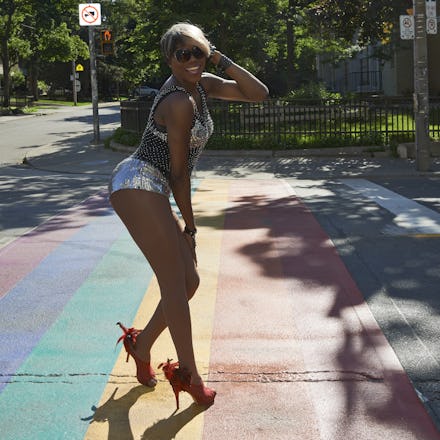Yaaass, You Have Black Drag Queens to Thank for the Internet's Favorite Expression

"Yaaass?" "Oh my god, yaaass!" "YAAASS!!!"
If you live on the Earth, you've probably heard some version of this positive affirmation.
The elongated, often droning exclamation has colonized vocal chords from coast to coast and spawned dozens of viral memes. But where exactly does it come from? Ilana from Broad City? That weird YouTube cat? Yogi Berra? All wrong.
There was, you've possibly seen, that viral Lady Gaga fan video a few years back, but that's not the origin either.
While the saying has been revived with a vengeance in modern times, the story of yaaass was a cake that took decades to bake — with cooks who didn't get credit for their work in the kitchen.
Meet John Connolly, a 22-year-old hotel concierge from Brooklyn, New York, who was just another fan waiting to catch a glimpse of Lady Gaga shortly before the 2013 MTV Video Music Awards. When he saw the star emerge from a studio, however, he erupted with the yaaass heard around the word.
"Yaaass! Yaaass Gaga, you look so good," he cried. "Oh my god, yaaass." Video of the fanboy outburst, which he later uploaded to Instagram, took the Internet by storm.
"It's something we just said naturally," Connolly told Mic. "I was just saying yaaass with everyone else."
The Internet did not react lightly to Connolly's exclamation. News outlets from Bustle to BuzzFeed rushed to coronate Connolly as a viral Shakespeare. "As far as I have been able to determine, it all started here, with Lady Gaga," Bustle reporter Lucia Peters wrote in April.
It seems, however, that none of these outlets made any serious contact with Connolly. MTV, for example, incorrectly referred to him by his Twitter handle, Johnny Versayce. Reached by phone, Connolly was adamant to Mic that he didn't invent the term.
"No, absolutely not, no and I don't take any of that credit," he said. "I know it's been around for decades, especially in the gay community."
Lavender linguistics: From words and expressions like "throwing shade," "fierce," "werk" and "realness," many of the most ubiquitous things we hear today originated from a unique LGBT vocabulary often colloquially referred to as part of "lavender linguistics," a term believed to have been coined by the American University linguist William Leap.
"There's something affective, there's something emotional, there's something about the way people pull together all kinds of properties of language to be able to convey this message of who we are as people," Leap said in a 2012 WBEZ radio interview.
Leap, however, said he was largely unfamiliar with yaaass and that he was "stumped" by its possible origins. "My first reaction to the spelling is it seems like it could be African-American-related," he told Mic, adding that if it was appropriated, it wouldn't be the first time. "The word 'hot,' the word 'hunk,' those are African-American terms from Harlem in the 1920s and before, that have filtered out of 'Harlemese,' as it is called."
A second researcher in the exceedingly small field of gay male slang, Paul Baker from the England's Lancaster University, was equally flummoxed. Baker, one of the world's foremost authorities with two published books on the subject said he had no idea where yaaass came from either. "This wasn't a word I came across when I carried out my research on LGBT slang," Baker told Mic.
An intriguing theory on the etymological roots of yaaass can be found hiding in plain sight. In the 1990 documentary Paris is Burning, director Jennie Livingston followed the lives of mostly black and Latino drag queens in New York during the 1980s, chronicling the city's unique drag ball scene. Vestiges of that era are still recognizable today in shows like LOGO's RuPaul's Drag Race.
During the film's opening scene, a black drag queen bedecked in gold also provoked screams of yaaass from an adoring crowd. Though separated by more than two decades, the similarities between the film and Connolly's "yaaass Gaga" are inescapable.
Someone who did have some concrete answers was Jeffrey McCune Jr., an associate professor of women, gender and sexuality studies at Washington University in St. Louis.
"It is an affirmation beyond affirmation," he told Mic. "It existed as far back as the 1980s, or even further."
McCune, who is African-American, said he was more than familiar with the term. He cited his own "ethno-autobiographical" experience as a marker.
So why did John Connolly get the credit? On that subject, McCune didn't miss a beat.
"On some level, the yaaass expression is an expression that one could argue was emblematic of the ways in which black gay culture permeates our society but gets unrecognized or downplayed," he told Mic. "Consumer culture says that we do not have to credit the source. We don't have to recognize the source."
Echoing others, McCune said the appropriation of black and minority contributions to LGBT culture went far beyond yaaass. "The larger white gay movement begins to think it created a term that it didn't create," McCune said." There is something important about recognizing the creativity and activity of people of color."
McCune, however, noted that the subculture among gay men was historically more diverse and inclusive than the wider society. In that context, he said, yaaass offered a timeless message regardless of gender or race or orientation.
"I really do feel like this affirmation beyond affirmation is an important expression, especially for those at the margins who are too accustomed to hearing no," he said.
Update: Oct. 7, 2015 The sentence which ended the article could be interpreted literally to suggest this is the first place you'd read the history of the word "yaaass." We've removed it. Yaaass.